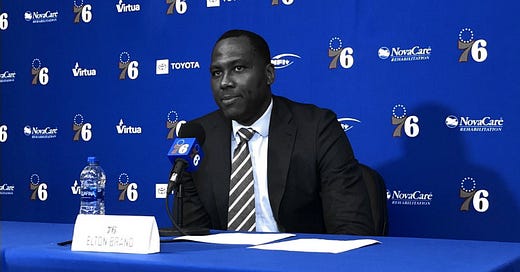Elton Stunk on Draft Night, But Ownership Is the Real Issue
When you want someone to blame, look beyond the general manager.
![[photo: Jon Johnson/KYW/WIP] [photo: Jon Johnson/KYW/WIP]](https://substackcdn.com/image/fetch/w_1456,c_limit,f_auto,q_auto:good,fl_progressive:steep/https%3A%2F%2Fsubstack-post-media.s3.amazonaws.com%2Fpublic%2Fimages%2Febaadca8-5564-464e-80fe-e39d6727ac52_800x400.jpeg)
Andrew Unterberger is a famous writer who invented the nickname 'Sauce Castillo' and is now writing for The Rights To Ricky Sanchez, as part of the 'If Not, Pick Will Convey As Two Second-Rounders' section of the site. You can follow Andrew on Twitter @AUGetoffmygold and can also read him at Billboard.
Andrew's writing is brought to you by Kinetic Skateboarding! Not only the Ricky's approved skate shop, but the best place to get Chucks, Vans, any apparel. Use code "DAVESILVER" for 9.1% off your order.
It’s not like we weren’t warned, really. “We could sell a pick,” Elton Brand very directly forecasted earlier this week when asked about the Sixers’ draft night plans. “That’s a possibility.” A pretty strong one, as it turns out, considering that of the Sixers’ four second-round picks last night, a whopping one (1) emerged as a (not particularly strong) candidate for the actual roster last year, with the other three swapped for future picks, attached as postage in getting Jonathan Simmons and his $1 mil owed out of town, and yes, sold for cash. Here’s to optionality!
The draft was a disappointing one for a great majority of Sixers fans, who ultimately were forced into the realization that the weeks and months they’d spent analyzing and projecting third- and fourth-tier draft prospects were entirely for naught. The Sixers got Their Guy in No. 20 overall pick Matisse Thybulle (at a cost, natch) but otherwise gave the second round a Donnie Jones-sized punt, with Brand’s post-game explanation (of, essentially, “Our team is already old and expensive and c’mon guys second-rounders really??”) satisfying few.
From just about any perspective, it was not a strong night for Elton. But while it’s troubling to see our GM fail to maximize our assets on a crucial night at a pivotal moment in franchise, it’s not nearly as concerning as the fact that the buck doesn’t seem to really stop with him in the first place. Increasingly, the evidence suggests that the team’s management situation is a muddled one, largely dictated by the needs and priorities of our untrustable ownership group.
Selling and punting on second-rounders is hardly a strategy unique to the Elton Brand era of the Process Sixers. The team did it under Brett Brown, they did it under Bryan Colangelo, they even did it under Sam Hinkie. Whether it’s a matter of not wanting to invest literal capital in unproven young players or just not valuing second-rounders as players and not wanting to make their development a priority, it seems to go beyond whoever is calling the shots in the front office, rather existing as something close to a franchise directive. Even as Sixers fans cry out -- rightly -- that these are cost-controlled assets who could end up saving the team money down the road if they pan out, it’s probably time that we stop playing Charlie Brown to ownership’s Lucy by thinking that this time, they’re finally not going to yank away our late picks when we come rushing at them with scouting reports on Carsen Edwards and Jordan Bone.
Elton Brand takes the hits as the guy calling the shots, and in fact, he deserves some of them, for regularly letting his vulnerabilities get exploited by the other 29 GMs. Setting his sights on Thybulle is one thing, but projecting his love for the prospect to the extent that the Celtics used their draft positioning to extort a high second-rounder from him (one right in front of the Sixers’ next selection, no less) because they knew the extent of Brand’s commitment is quite another. Dealing out of the 34th pick for the 57th and a couple future second-rounders is arguably justifiable, but compared to the bounties reaped by Detroit for the 30th pick (four second-rounders and $5 mil cash) and by Dallas for the 37th (two future second-rounders and the No. 45 pick), it’s not particularly impressive. There just haven’t been many deals the Sixers have pulled off in the past year that look better the deeper you go into the fine print, and too often they end up seeming far worse.
But to the people behind the “Fire Elton” calls that began to bubble up last night -- what exactly gives you any confidence things would be better with whoever takes his place? It’s probably fair to assume at this point that part of the reason Brand was hired in the first place is because of his willingness to toe the line, down to him publicly preaching the company gospel about collaboration (and name-checking every one of said collaborators, all of whom remain installed from the Colangelo administration) in nearly every press availability. A number of folks in my mentions last night insisted that it was the responsibility of the GM to buck against ownership when pressured to divest of their second-rounders -- it’s what Sam would have done. Well yeah, but Sam’s out, and Elton’s in, and there’s a reason for that. While the latter certainly doesn’t seem to be as good as getting the extra 10% out of his dealings as the former, he’s at least smart enough to grasp that maybe picking his battles with ownership over those dealings gives him a better chance of getting to stay in command in the first place.
The problem here is twofold: Elton Brand and Company don’t seem to be particularly good at winning deals in their details, and the ownership likely prefers a management group that doesn’t sweat the small stuff over one who refuses to color within the parameters they outlay. Both problems are serious, but the latter is the one that isn’t necessarily fixable. If Harris and Blitzer and their cohorts are now officially of the mindset that them being the dudes to sign the checks entitles them to be the ones to dictate the direction and velocity of the team’s maneuvering -- and to say when they want to save a couple million for their troubles -- then that’s just who the Sixers are now and moving forward, and that’s a bigger hindrance to winning at the highest level than any individual draft-night dealings, no matter how ill-advised they are in concept or how consequential they end up being.
And by the way, this is a looming issue with the entire Run It Back gameplan in general. Ownership has said that they’re willing to go deep into the luxury tax to keep the team’s starting lineup together moving forward -- and maybe they actually are, which not all team moneymen are in the first place. That’s great. But to do that essentially gives them the goodwill and PR leverage -- if not just the outright cover -- to skimp wherever else they want around the margins. Everything else becomes luxury goods by comparison, and the first time Elton, Brett or anyone else gripes you know we really coulda used one of those at a denied mini-mid-level signing, traded role player or sold draft pick, they can point to the tax bill and say hey don’t look at us, we’re doing our part. In other words: This might not have been the last postseason where we end up in a do-or-die game needing eight good minutes from Greg Monroe.
“I need every dollar I can get,” Brand said in his press conference following the draft, by way of explaining the team’s cost-cutting measures last night. He might have meant that mostly in terms of practical concerns of cap space and avoidance of the tax apron, but he also had to at least partly mean it in terms of appeasing the guys actually spending those dollars -- the guys paying his salary, and the guys who are gonna make sure they’re getting their money’s worth, with him and everyone else. And more than Elton, more than free agency movement, more than the Celtics or Raptors, maybe even more than Joel Embiid’s knees, they might be the biggest obstacle to this team ultimately winning a championship.






